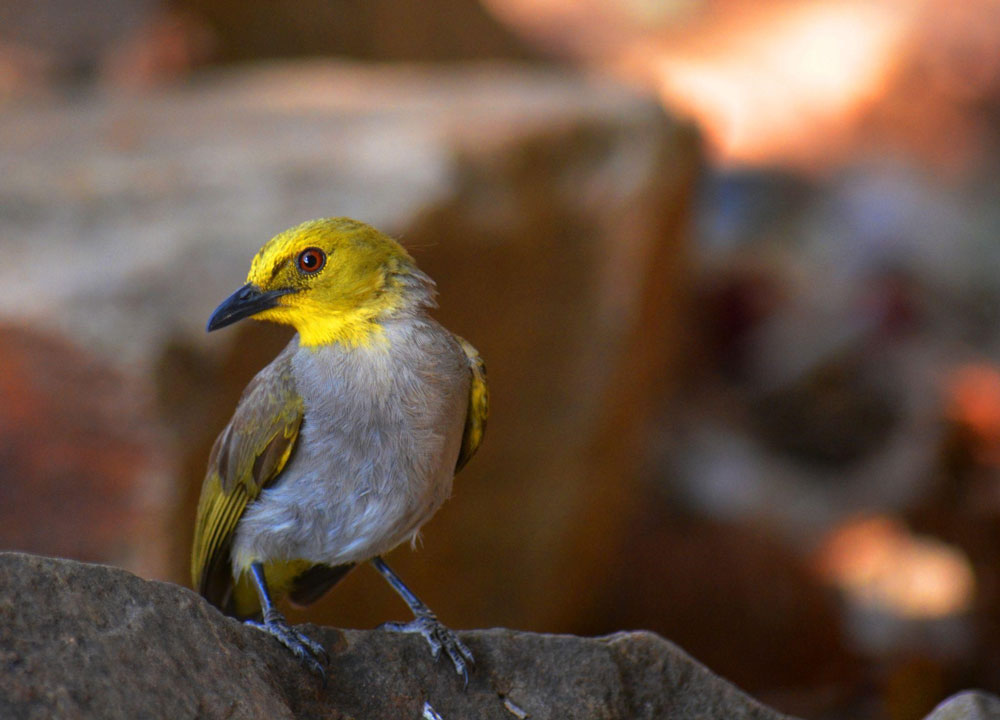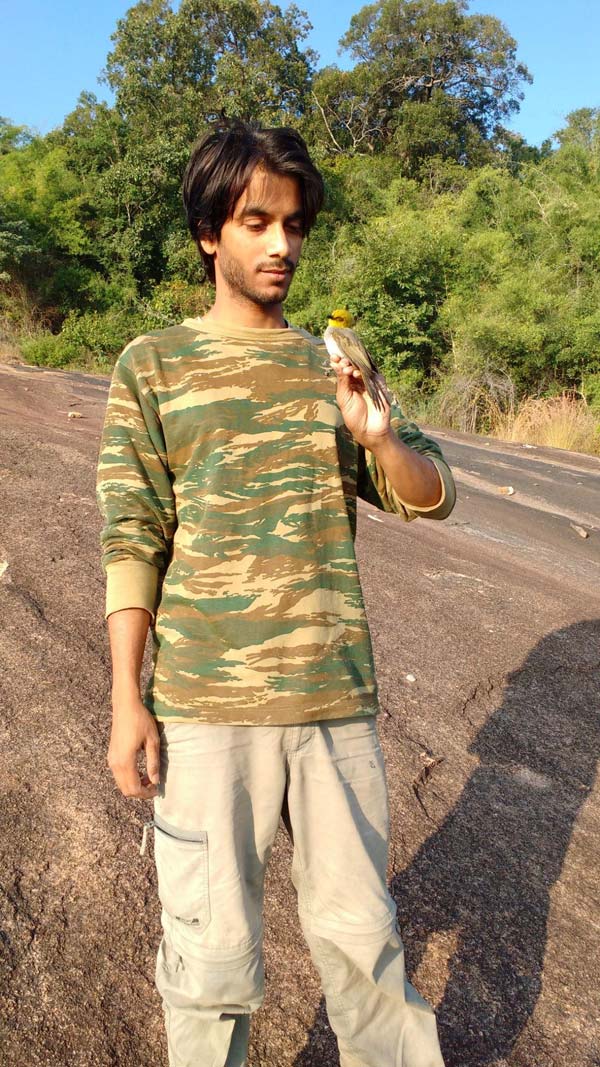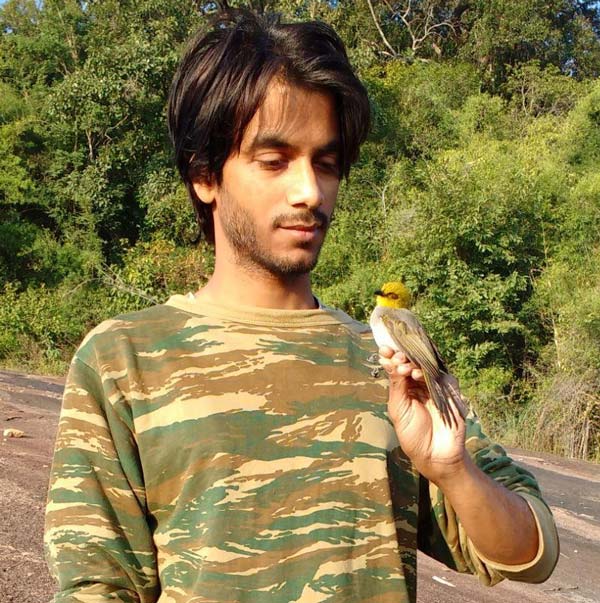As an amateur birdwatcher, I faced great difficulty in identifying birds. I have always preferred to go birdwatching alone. Whatsapp didn’t exist back then and I was not into using Facebook. I would rely solely on field guides for correct species identification. Sometimes, I could not match the exact features of the bird I saw with those given in the field guides. On all those occasions, it would occur to me that probably it’s a new species which I have just discovered! I would get thrilled with the idea of describing a new species to science and getting to name it. I have difficulty in remembering bird calls and I often associate species calls with certain phrases which helps me remember them. One such species is Puff- throated Babbler. It gives a 3-note call “pre-tee-dééér”; to me it sounds like ‘Dekhai Chee-Ye’ which in my mother-tongue Maithili means ‘do you see’.
This is how my love for birds took shape….
I have a background in Engineering, and never had any formal education in Ecology. I have always had an interest in wildlife and nature, but had no idea of how to make a career in this stream. Internet was not as easily accessible as it is today and like most other school goers, I knew only about a career in the Engineering and Medical professions. Things were clearer to me only after Post Graduation in Biotechnology, when I applied for a PhD to only those institutions which had ecology. When I started off with my PhD, I had no preferred taxa or species, nor any specific research question. I was just happy to be able to visit the forests and relished the idea of being surrounded by wilderness. In 2014 I joined the Laboratory for the Conservation of Endangered Species (LaCONES) at CSIR-CCMB Hyderabad. One of the rooms of my hostel was always locked and a pair of rock pigeons had built their nest there. Once, when I entered the room, the chicks got wary of my presence and started to hustle away. I wondered how the chicks that have never seen any human or any other species knew that I am to be feared. It started a train of thoughts on all possible behaviors which a species does not learn, but expresses, as if it is encoded in their genes. Few days later I was allotted a lab for my PhD. My supervisor was a herpetologist, but I was not enthusiastic about frogs or any reptile. When he asked me which taxa I would like to take up for my research, without much thought I said, “birds”. When he asked, “What topic in birds”, after a brief thought, I said, “Behavior”. By that time, it was clear in my mind that I wanted to study how birds learn to make their nests. I had not joined a PhD in any ongoing-lab project. So I was exploring all possible research questions that would allow me to do field work and have genetic a component in it. Seeing my interest in birds, my supervisor suggested Yellow-throated Bulbul. I spent the first few months visiting places in South India where the species is found and read up on everything that was available on this species. There was not much information available and it seemed like a good candidate species for a PhD research. My research questions evolved over time, and included elements of biogeography, population genetics, and the environmental niche of Yellow-throated Bulbul.

The Yellow-throated bulbul. During my PhD at CCMB Hyderabad, I studied the biogeography, population genetics, and the environmental niche of Yellow-throated Bulbul.
Currently, I am working as a research associate on the Kerala Bird Atlas project at Kerala Agricultural University. This is a state-wide citizen science exercise where over 500 volunteers have systematically surveyed 3000 sites during 2015–2020. The volunteers noted bird species during the wet season and the dry season, yielding 0.3 million records of 380 species. I am analyzing this dataset to look for patterns of species-richness and factors affecting it. My aim is to use this data to draw inferences that can aid in conservation.
I like what I do because….
This is not like a routine job; there is always something new to do, some new research questions to address, some new analyses/techniques to learn. When most other people take a break from their work, they visit wilderness (parks or forests). Ecologists visit wilderness for data collection as a part of their job, they also visit wilderness when they take a break from their job. Being an ecologist is like making a career out of your hobby. There is never a moment of boredom.

Me at DevarayanaDurga, Karnataka, with a yellow- throated bulbul
The challenges I faced….
My PhD work involved mist-netting for Yellow-throated Bulbul in 5 different states in India. It took me three years to secure relevant permits. Those permits came with restrictive rules which adversely affected the sample size and compromised the final results. All science requires funding, which is difficult to come by when your research topic is not a priority for the funders/Government. Lack of funds meant that I could not hire field assistants and could not invest in my personal well being such as decent accommodation and ease of travel during the field visits.
My advice to young researchers….
Be aware of the challenges that lie ahead and set realistic ambitions. Research in ecology/ ornithology involves not just visiting forests but also securing funds, securing permits, arranging logistics, data collection, analysis, and finally publication. There are challenges at each of these steps; one gets better in handling adverse situations over time. Further, it takes longer to land a secured job in research than most other career options such as medicine, engineering or MBA. Every person has his/her strengths, weaknesses and priorities in life. Talking to early career researchers can help in making better decisions.
Dr. Ashish Jha
PhD: CSIR-CCMB Hyderabad (2014-2020)
Research Associate: Kerala Bird Atlas Project, Kerala Agricultural University (2021-2022)
Email: aashishjha89[at]gmail[dot]com
Twitter: @ashishdurg


Congratulations on your PhD and nice to read about your journey in brief…🙂👏👏
Best Wishes Friend…!
Really an inspiring journey, Ashish. Thanks for advising young researchers to have realistic aims keeping funding and permits in mind. Looking forward to read your research inferences based on Kerala bird atlas which would help in conservation of birds. Thanks again for penning down this article 🙂
I never knew that u were an engineer. Sir , it inspiring for me after reading this .now I know if u have that much curiosity or interest u can go in research field. I really like the personilatity of yours of being straight forward, straight to the point .